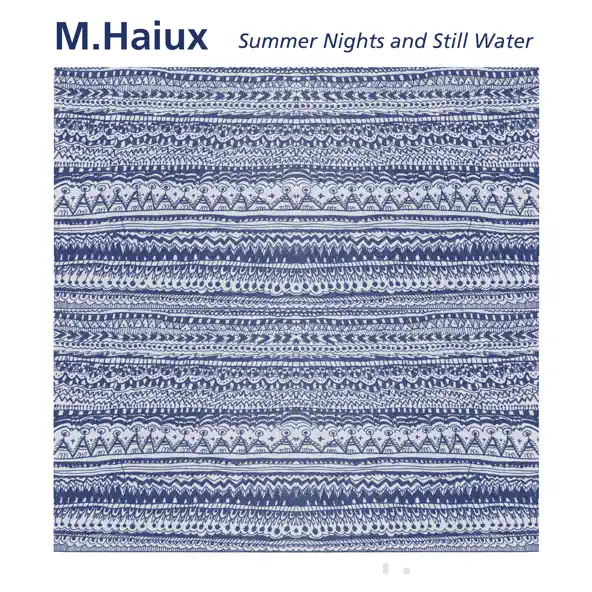If you know of her, but don’t know her, probably you wouldn’t guess it, but my partner has deep musical roots in folk, in the stuff of grange halls. We’ve had years of easy Sunday mornings, her intuitively plucking at an ancient banjo in the kitchen over coffee. Years of willing her century-old Sears fiddle to stay in tune. When we first met, eighteen years ago, she had a radio show devoted to old-timey folk and country practitioners. When we first met, she gave me a handmade box set of foundational folk recordings, which I still have and treasure, and which was, outside of the LPs my parents listened to, my introduction to the genre. Like a lot of people, I came to folk music through loved ones.
So, why am I telling you all this? Well, M.Haiux’s transporting, semi-improvised new album of finger-picked folk guitar instrumentals, Summer Nights And Still Waters, has got me feeling familiar. Familial even. Lately, I’ve written and read a fair amount of writing about folk music in a more macro context, the context of Big Ideas. About folk as radical, anti-establishment, revolutionary music – music in opposition to. About folk as a locus point for inclusive community building. And it is those things, for sure. But given how it is often passed down and performed in private or semi-private settings – by friends and family for friends and family (however you define that) – it is also music that flourishes especially well in the realm of the micro, the insular. Family rooms, front porches, bedrooms. This, it seems, is where M.Haiux, aka ex-Cranebuilder Matthew McPartlan, can be found, guitar in hand, crafting melodies that stick.
All sorts of music can be sticky, in my experience folk music has been stickier than most, a quality that Summer Nights seems to strive for, and, indeed, embody. What I mean by this, without being too corny, is that when played with the right generosity of spirit, as McPartlan does here, in the right circumstances, this is a music that can adhere itself to little moments – little, forgettable things – and turn them into memories. Which is a huge thing but easy to take for granted, to overlook in favor of overt aesthetic innovation or whatever. Likewise is the way a record like this can shine a mental spotlight on something you nearly forgot to remember. For me, the unhurried, golden-lit album opener ‘Trusting Aesop’ is Iowa corn alongside the highway, tall in the sunlight. It’s tracking down Takoma sides at that record shop across from the BBQ place with the good root beer. I don’t exactly know why it is that, but I can see it clear. I can almost smell it. A record like this, it feels like I’ve always known it – like I could have been listening to it then – even as I’m discovering it.
They say familiarity breeds contempt, but I don’t think that’s true, really. Especially when it comes to folk music. Folk music needs to be conversant with its ancestors, chatty even. The sprightly buoyancy of ‘The Wild Reality’ had me practically running to the basement to dig out our Fahey, then rushing back upstairs to put on ‘Sligo River Blues’. Not out of any overt similarity necessarily, but because these recordings needed to speak to one another – were speaking to one another. Now, I’m not saying ‘The Wild Reality’ has the staying power of ‘Sligo River Blues’ – only time will tell on that front – but what I am saying is that it converses with its forebear beautifully, fluently. Similarly, there’s a moment right near the end of ‘River Ribble’ that calls out to Richard Dawson so loudly that it can’t be anything but intentional. Here, though, the implicit threat of violence that permeates so much of Dawson’s work is gone. In its place is a joyful ease, a full-bloom kindness, a gentleness that characterises the bulk of Summer Nights And Still Waters. There is, at times, a sort of bittersweetness, and a certain kind of drama, but it possesses the soft magic of the quotidian, like pulling creeping Charlie and bindweed from the garden.
I could go on. I could dig into how McPartlan’s playing is pretty much the right amount of imperfect, how the recording is pretty much the right amount of lo-fi, how his improvisational instincts on tracks like ‘Weirdo’ seem on point, but right now, it’s Sunday morning, and my cat is on the table, blinking slowly. I’m hearing cicadas and crickets drone and drone, but I’m listening to ‘Oak Beck Stomp’. Outside, my partner is picking tomatoes. The light through the curtains is bright and perfect, the music is still playing, and my heart is full up. I hope I don’t forget this moment and I don’t think I will. And that’s saying more than enough.


